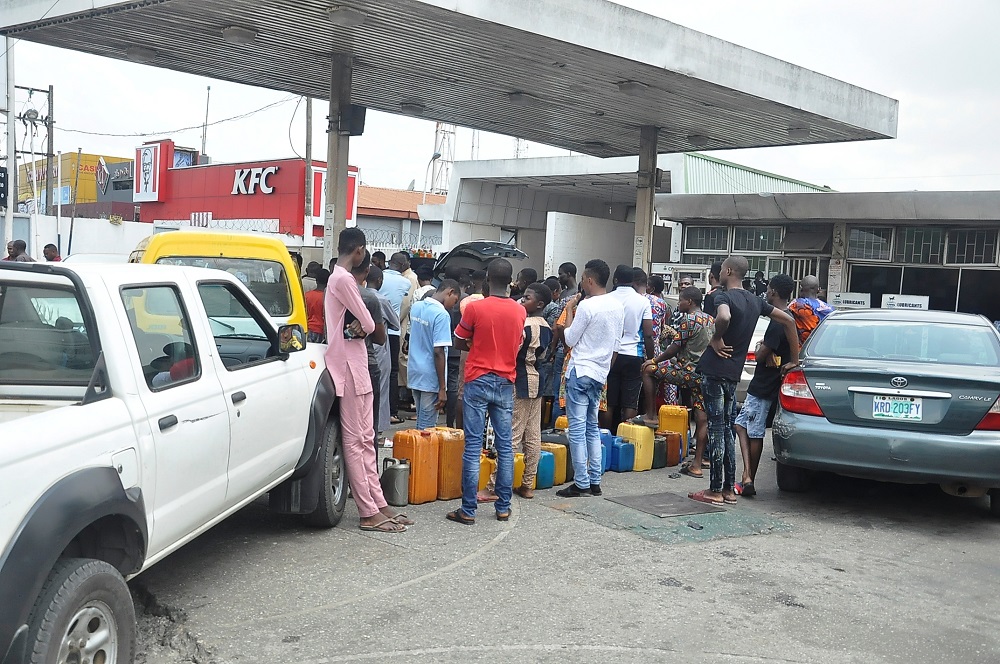Scandalous U-turn on fuel subsidy
If any Nigerian were in the search for the true character of this government, for the very style of President Buhari’s leadership, and for the reasons why nearly every aspect of our national life has stagnated or worsened over the past seven years or so, they should look no further than the government’s recent U-turn […]

FILE PHOTO: Motorists and human queue at filling station
If any Nigerian were in the search for the true character of this government, for the very style of President Buhari’s leadership, and for the reasons why nearly every aspect of our national life has stagnated or worsened over the past seven years or so, they should look no further than the government’s recent U-turn on fuel subsidy.
The misgovernance of fuel subsidy has been a long running nightmare for Nigeria and Nigerians. But the chapter of this story written by this government is worse than anything Nigerians have seen before. Yet, this government’s mismanagement of fuel subsidy is not just a story of policy flip-flops and governmental indecision in a crucial sector of our national economic life, but a representative core of the true character and style of the Buhari administration.
That character and style can be described in a few words: the absence of leadership at the highest level. Critics of this government often point to an array of governance failures—rising poverty, worsening insecurity, poor public communication that fuels disunity, and so on—as evidence that the president is doing a bad job. These may be true, but they still miss the point. The problem is not that the administration is doing a bad job; it is that the president is not doing the job at all. And it is this being on the job without being on top of it, and this hands-off, absent-minded character and style of leadership that this policy reversal illustrates above all.
Although there had been plans to remove fuel subsidy completely since 2020, and even much earlier, moves to that effect became much more pronounced when the government finally passed the petroluem industry act in August last year.
As a legal framework, the PIA passed by the government in August last year touches on many subsectors of our beleaguered oil industry. But the removal of fuel subsidy was at the centre of it all, since the new Nigerian National Petroleum Company (NNPC) Ltd into which the PIA transformed the former Nigerian National Petroleum Corporation (NNPC) cannot, by definition, offer subsidies as a private company, if still wholly owned by the government.
By backtracking from this official position, the federal government is now in an unprecedented governance position where fuel subsidy is effectively removed by law, but not in practice. That is, a situation where government passed a law only to discover within months that it is unable, not just unwilling, to implement its provisions precisely because there was no prior clear understanding of its full implications.
So even if the Ministry of Finance manages to get the National Assembly to rubber stamp a supplementary budget of N3 trillion, there is really no existing legal framework for spending it on fuel subsidy, unless the government pays the money to the NNPC Ltd, repeals the PIA or finds a legal way to defer its take-off date beyond the initial gestation period of six months from its passage in August. This is the legal and political conundrum the government finds itself. And it is scandalous.
But how did the government arrive here? In November last year, the Honourable Minister of Finance, Budget and National Planning, Dr Zainab Ahmed said there will be no provision for fuel subsidy payments in the 2022 budget. Later that month, the Group Managing Director and Chief Executive Officer of the NNPC Limited, Malam Mele Kyari also told Nigerians that fuel subsidy removal is now effectively backed by law, while the finance minister promised N5000 in monthly transport support to 40 million poorest households for six months.
But then on 18th January, the President of the Senate, Ahmed Lawan told the world that President Buhari himself never asked anyone to remove subsidy, a statement reinforced by the Minister of State for Petroleum Resources, Timipre Sylva that the President does not support fuel subsidy removal at all. Thereafter, the government officially backtracked on fuel subsidy removal, and announced supplementary measures for continuing its payment at the expense of Nigerians through ever more borrowings.
In other words, Nigerians end up with two very contradictory legal and political positions by four senior government officials on the same policy. If the President did not give anyone directive for subsidy removal, then the relevant sections of both the PIA and the 2022 budget were pushed through without his knowledge or authorization. If, on the other hand, the President was aware that the PIA he signed effectively removed fuel subsidy but now backtracks on the realization of the heavy political costs associated with it for himself and his party in the coming elections, then it means the government acted before thinking on a major policy.
Either way, it is a personal scandal for the president because both possibilities imply that the man at whose table all the buck stops does not do his due diligence with the content and substance of the bills he signs. In sum, the policy flip-flop on fuel subsidy is reminder that President Buhari needs to take the job more seriously.
